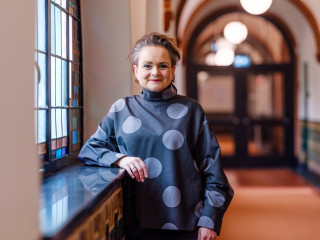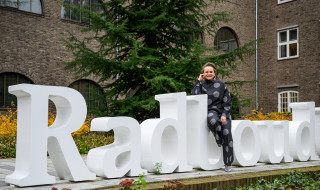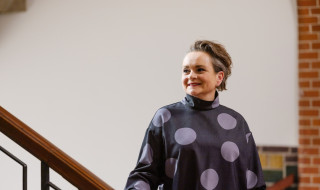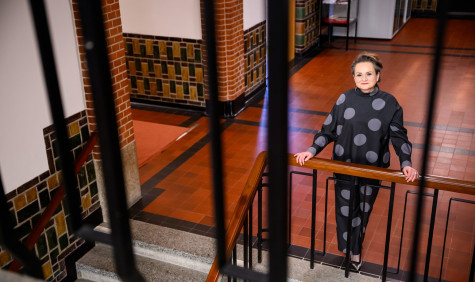Alexandra van Huffelen: driver of big moves
"AI can be applied in education and research in a values-driven way"
Digital transition has been a central theme throughout Alexandra van Huffelen’s career. She was the first State Secretary for Digitalisation and has served on the boards of major organisations with important public responsibilities. Now, as president of the Executive Board of Radboud University Nijmegen, she is committed to digital autonomy and the development of the region.

Alexandra van Huffelen
"It is evident that digitalisation can no longer be separated from our lives. And therefore also not from the lives of students and people who teach and do research." Alexandra wants her university to make the right choices in this regard.
Ensuring the responsible use of AI
"We need to ensure that digitalisation and new technologies such as generative AI play a positive role. That is quite complex. By now, we know that you can use generative AI to write a paper. But that is, of course, not what it is intended for. The same goes for research. You can have generative AI do research and generate the most beautiful and powerful outcomes. However, this has nothing to do with doing scientific research according according to the methods we use to reach robust conclusions. We need to address this."
"There is plenty of research work to be done on AI"
AI can make things more efficient. It can be used in a values-driven way in education and research. For example, sustainability and with regard for privacy. For example, you can set up your administration in a more efficient way. "That is what we are going to use this technology for," the board member notes. "And in such a way that it complies with security requirements, privacy protection and the public values we all share. This will help us become digitally autonomous, especially if we cooperate with other universities and with SURF. At the same time, for many applications we still do not know how to use AI effectively. There is still plenty of research work to do there."
The university as a place for societal solutions
Alexandra considers it important to highlight that universities serve a societal purpose. Until everyone is convinced of this, she sees a role for herself in making that case. "As a university, we have to show what we do. Here is where we work on solving Parkinson's, on stimulating the brain to fight depression, and on insights into how to solve conflicts in society as well as in people's private lives. We develop smart chips and intelligent AI that are becoming more and more efficient and work better. At Radboud, we have a medical faculty where fantastic research is being carried out, for instance into how health and living environment interact."

"I enjoy leading large organisations with complex challenges"
From government to university
She is enjoying her work at the university. "It's a wonderful institution with amazingly enthusiastic people," she says. Radboud has around 25,000 students and over 9,000 staff members.
But what was it like to move from being a former State Secretary to joining the executive board of one of the Netherlands’ fourteen universities? After the cabinet in which she served came to an end, the board member began looking for a new position. "I have a lot of experience in the public-private sector. I worked for a long time in the energy sector and in public transport. This gave me a love for organisations that operate at the interface of public and private domains." Another characteristic is the size of the organisations she worked for. All of them have been large. "I love leading large organisations with complex challenges," she says.
"There is a role for the new government"
Decoupling from big tech companies
There is no shortage of complex challenges at universities. Alexandra started her new job at the university at an exciting time. In February 2025. It was already clear that budget cuts were looming and they were confirmed in the Spring Memorandum.
"Universities face significant cuts that do not make it easy to continue doing our job. I am counting on the next government to invest more in research and our growth internationally. We need that. Dutch universities are among the top in the world. One of our greatest assets. We need to stimulate that, not restrict it."
This interview took place before the elections. At the time, the board member expressed the hope “that the coming elections will help steer us back in the right direction”. With her party, D66, winning the election, that hope now seems to be realised. "There is a role for the new government. This will not only allow the Netherlands to maintain a top international position as a knowledge country, but also allow knowledge institutions to decouple from big tech companies and become digitally autonomous."

"Education is incredibly important as a driver of emancipation"
Gaining momentum and building support
Besides bringing structure to complexity, Alexandra also likes to speed things up. "We have to, the world around us demands it. The developments around generative AI are happening now. If we wait a few more years, we will miss the boat entirely. Then we won't know at all what we are doing and how to apply this technology in a responsible and safe way." Meanwhile, she knows from experience that it is always best when there is support for decisions. "It is helpful when people acknowledge, recognise and accept the direction being taken. That takes time .But within that context, you can certainly move at pace.”
The drive she is known for has been with her since childhood. Alexandra developed a passion for education and research through values she inherited from home. "My father worked at a university. Education is incredibly important as a driver of emancipation; the ability to educate people and encourage critical thinking, and thus get progress for society, for a country and for the individual."
“We need to consider issues such as privacy and where we store our data”
The digital world and public values
From Rotterdam to Amsterdam, to The Hague and now Nijmegen. Alexandra has worked in many parts of the country. "It is incredibly fun to get to know the administrative strength and development of yet another part of the Netherlands. I really enjoy working and don't get tired of it easily." Fortunately, because the many challenges in education and research will keep us busy for a long time to come.
"The digital world does not yet in all respects meet the public values such as openness and transparency, which we strive for together in education and research. We need to consider issues such as privacy and where we store our data. We can do this much better if we do it together rather than each on our own. If we want to work with alternative security methods or store data locally or as close to home as possible, then we will need SURF very much indeed.”
Text: Maureen van Althuis
Photos: Jelmer de Haas
